
FILE – In this Thursday, April 8, 2021 file photo, the Johnson & Johnson COVID-19 vaccine sits on a table at a pop up vaccinations site the Albanian Islamic Cultural Center, in the Staten Island borough of New York. The U.S. is recommending a “pause” in administration of the single-dose Johnson & Johnson COVID-19 vaccine to investigate reports of potentially dangerous blood clots. (AP Photo/Mary Altaffer, File)
WASHINGTON (NewsNation Now) — A U.S. health panel says it’s time to resume use of Johnson & Johnson’s COVID-19 vaccine, despite a very rare risk of blood clots.
Out of nearly 8 million people vaccinated before the U.S. suspended J&J’s shot, health officials uncovered 15 cases of a highly unusual kind of blood clot, three of them fatal.
All were women, most younger than 50. But advisers to the Centers for Disease Control and Prevention voted 10 to 4 on Friday, saying the vaccine’s benefits outweigh that serious but small risk — especially against a virus that’s still infecting tens of thousands of Americans every day.
The government will rapidly weigh that recommendation in deciding next steps.
The panel last week called for more data about a possible link to rare blood clots in the brain before deciding how and whether to end a “pause” of J&J inoculations called for by the CDC and the Food and Drug Administration. Both agencies said it would continue investigating unusual clots that occurred six to 13 days after vaccination, in combination with reduced platelet counts.
“I appreciate the importance of acting swiftly” on that advice, said CDC Director Dr. Rochelle Walensky. She hoped for “a recommendation that takes into account the risk versus reward” of using J&J’s single-dose vaccine.
The one-shot J&J was considered an important addition in bringing the vaccine into harder-to-reach populations since it does not require cold storage or a second appointment. More than 6.8 million doses of J&J have been administered, according to the FDA.
Some panel members had argued that an extension of the pause could send a message to the world that the vaccine had major safety issues. Six women under age 50 developed rare blood clots after receiving the shot. All women were between the ages of 18 and 48, with symptoms occurring six to 13 days after the vaccination. One person died and all of the cases remain under investigation.
The United States has ordered enough doses of vaccines from Pfizer Inc/BioNTech and Moderna Inc to cover all adults, but many senior regulators, including the nation’s top infectious disease chief Anthony Fauci, have signaled they hope to resume use of the J&J vaccine saying the chances of the blood clots occurring are less than one in a million.
Fauci says the pause by regulators is a “testimony to how seriously we take safety.”
“It really allows both the FDA and the CDC to further investigate these cases to try and understand,” Fauci said last week.
The CDC said it will recommend the pause until the advisory committee reviewed the cases and assessed implications.
The European Medicines Agency on Tuesday recommended adding a warning about unusual blood clots with low blood platelet count to the vaccine’s product label, saying that benefits of the shot outweighed the risks. The drugmaker has said it would resume rolling in the region.
J&J has faced several setbacks since its shot gained emergency authorization use in February, first drawing scrutiny over its halting process to scale up production of the vaccine, and then over rare cases of clots in a handful of vaccine recipients. Earlier this week, FDA inspectors blasted the cleanliness and medical safety of an Emergent BioSolutions plant making the J&J vaccine in a report released Wednesday.
European regulators said the blood clots in patients who received the J&J vaccine bear close resemblance to 169 cases in Europe reported with the AstraZeneca vaccine.
FDA and CDC officials said a key reason for the pause was to communicate the risk to doctors on how to recognize the side effects and treat them.
The agencies are recommending that people who were given the J&J vaccine who are experiencing severe headache, abdominal pain, leg pain, or shortness of breath within three weeks after receiving the shot contact their health care provider.
Patients who exhibit clot-related symptoms after receiving the J&J vaccine should not be given heparin, a blood thinner widely used to treat clotting disorders.
CDC’s Dr. Anne Schuchat said authorities have not seen similar clots after the use of the two other authorized vaccines: Pfizer or Moderna vaccines. Schuchat said people should continue to get vaccinated with those shots.
About 89.2 million people, or 26.9% of the U.S. population, have been fully inoculated with COVID-19 vaccines made by Pfizer Inc/ BioNTech SE, Moderna Inc and Johnson & Johnson, according to CDC data. 40.9% of the U.S. population or 135.8 million adults had received at least one dose of a COVID-19 vaccine.
Download the free NewsNation Now app to receive updates on this developing story.
The Associated Press and Reuters contributed to this report.

